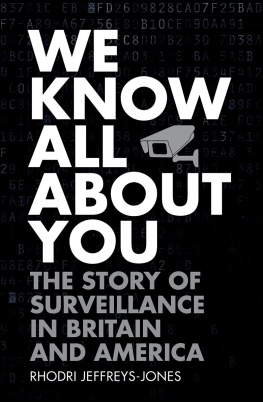Oxford University Press is a department of the University of Oxford. It furthers the Universitys objective of excellence in research, scholarship, and education by publishing worldwide. Oxford is a registered trade mark of Oxford University Press in the UK and in certain other countries
All rights reserved. No part of this publication may be reproduced, stored in a retrieval system, or transmitted, in any form or by any means, without the prior permission in writing of Oxford University Press, or as expressly permitted by law, by licence or under terms agreed with the appropriate reprographics rights organization. Enquiries concerning reproduction outside the scope of the above should be sent to the Rights Department, Oxford University Press, at the address above
You must not circulate this work in any other formand you must impose this same condition on any acquirer
Published in the United States of America by Oxford University Press 198 Madison Avenue, New York, NY 10016, United States of America
Links to third party websites are provided by Oxford in good faith and for information only. Oxford disclaims any responsibility for the materials contained in any third party website referenced in this work.
I would like to acknowledge the help of a number of individuals who helped me prepare this book for publication: Paul Addison, David Anderson, Richard B. Bernstein, Alun Burge, Duncan Campbell, Doug Charles, Bob Cherny, Frank Cogliano, Malcolm Craig, Jane Dawson, Harry Dickinson, Owen Dudley Edwards, Sylvia Ellis, Neil Evans, Frances Goldin, Alex Goodall, Annette Gordon-Reed, Fabian Hilfrich, Louise Jackson, Jay Kleinberg, John A. Logan, Chris Moran, Kathy Olmsted, David Omand, Lucy Parker, Damien Van Puyvelde, Charles Raab, Rob Singh, David Stafford, Pat Storey, and Reg Whitaker.
These men and women showed exceptional collegiality in advising me on research and in supplying critiques of my work in draft. Many corrections and improvements came from my private readers, and frank advice caused me to delete various ill-conceived passages.
The idea for the book arose in conversation with Matthew Cotton at OUP, and he has been a most supportive editor.
To all the foregoing, I am deeply grateful.
If I have retained my sanity throughout these proceedings, it is thanks to the distractions of matrimony, and for that I am grateful, as ever, to my wife Mary.
Its for you. I left my room in search of the phone. Back in 1964, English boarding houses were primitive and there were no extensions, let alone Wi-Fi. Picking up the receiver four floors down, I heard my fathers voice.
The Bishop of Bangor called. My father and the bish were pals.
He has received a strange request from the security service. The Americans had lodged a query about my visa application to be allowed to study in the United States. There was some troublesome information about me. Would the bishop kindly supply a report that would help decide the matter one way or the other?
I knew what this was about. As a schoolboy five years previously, I had attended a church conference in Bangor and fallen under the spell of Father Trevor Huddleston, a supporter of the South African communist Nelson Mandela. Responding to an invitation from BBC Radio Wales, I had delivered a Welsh-language talk in support of Mandela. I was quite impressed that the Americans must have translated it.
So what shall I tell the bishop?, asked my father.
If I phone you back tomorrow, Dad, can I reverse the charges? The next day, I dictated a glowing character reference to the old man. He relayed it to the bishop. I assume that the bish passed it on to his original interlocutor, and that it found its way to the American Embassy. Anyway, the visa arrived.
I had further experiences with watchers in that decade. At Harvard, as a postgraduate fellow who advised an undergraduate committee on the selection of visiting lecturers, I had responded to the complaint that they had dull speakers. To enliven the programme, I suggested the historian Herbert Aptheker. A member of the American Communist Party, Aptheker had outraged the political establishment by visiting North Vietnam, a country engaged in military hostilities against American forces (the invitation almost got my undergraduate counterpart expelled from the university). The day of the talk arrived, and we headed to Bostons Logan Airport to collect our guest. Driving along Storrow Drive on the way back to the campus, I noticed we were being followed. Oh, said Aptheker, thats Fred, my FBI tail. Hes a regular guy. We baby-sit for each other.
Another experience occurred many years later, on 19 October 2015. On that day, I wanted to access the consumer magazine Which? and searched for it through Google. That private organization facilitates the lions share of online searches, and what I am about to say is doubtless a common experience. Instead of putting me through to my chosen destination, Google asked me first to agree to its terms and conditions, a requirement I had not previously been aware of. Its privacy reminder stated that Google collected data about its users, drawing on online search information about restaurants visited, videos watched, and so forth, and that it processed the information to find out, for example, where users were located. It used the information to improve servicesand to deliver ads. In other words, if you use Google you are under a sophisticated form of private surveillance.
My goal in this book is to tell the story of surveillance in two countries that have been intimately linked in digital as in other matters, the United States and the United Kingdom. My focus will be on the understudied phenomenon of private surveillance, as well as on public surveillance in the two countries. I point to unsavoury aspects of the history of the surveillance state and underline the potential for further harm; I also emphasize that private surveillance has been detrimental to US and UK citizens rights in the past, and represents a real danger today.
In the book I am at pains to show that private surveillance does confer benefits. Take, for example, the video facilities built into mobile phones. Quick-witted citizens have recorded racist chants in football games in the United Kingdom and France, and exposed the behaviour of trigger-happy policemen in the USA. One sociologist has noted how every individual can be a potential electronic eye on the misbehaviour of organizations and the abuse of power.
Nevertheless, the growing dangers of private surveillance are real and tend to be overlooked or subordinated to fears of state surveillance. For example, George Orwell addressed the danger of the security state in his 1940s novel Nineteen Eighty-Four, but ignored private snooping. Sixty years later, an article in the Islington Tribune focused on a peculiarity of the area around 27b Canonbury Square, Orwells London address at the time of









